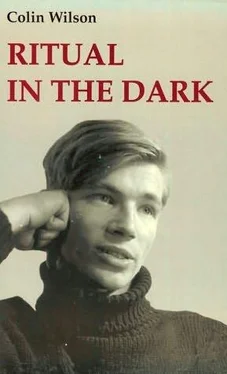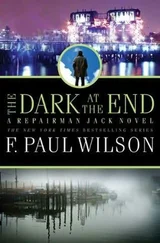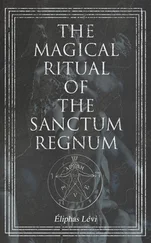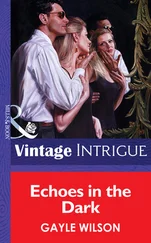Colin Wilson - Ritual in the Dark
Здесь есть возможность читать онлайн «Colin Wilson - Ritual in the Dark» весь текст электронной книги совершенно бесплатно (целиком полную версию без сокращений). В некоторых случаях можно слушать аудио, скачать через торрент в формате fb2 и присутствует краткое содержание. Жанр: Триллер, на английском языке. Описание произведения, (предисловие) а так же отзывы посетителей доступны на портале библиотеки ЛибКат.
- Название:Ritual in the Dark
- Автор:
- Жанр:
- Год:неизвестен
- ISBN:нет данных
- Рейтинг книги:4 / 5. Голосов: 1
-
Избранное:Добавить в избранное
- Отзывы:
-
Ваша оценка:
- 80
- 1
- 2
- 3
- 4
- 5
Ritual in the Dark: краткое содержание, описание и аннотация
Предлагаем к чтению аннотацию, описание, краткое содержание или предисловие (зависит от того, что написал сам автор книги «Ritual in the Dark»). Если вы не нашли необходимую информацию о книге — напишите в комментариях, мы постараемся отыскать её.
Ritual in the Dark — читать онлайн бесплатно полную книгу (весь текст) целиком
Ниже представлен текст книги, разбитый по страницам. Система сохранения места последней прочитанной страницы, позволяет с удобством читать онлайн бесплатно книгу «Ritual in the Dark», без необходимости каждый раз заново искать на чём Вы остановились. Поставьте закладку, и сможете в любой момент перейти на страницу, на которой закончили чтение.
Интервал:
Закладка:
This is what pathologists refer to as 'the remains'.
There was no resemblance to living humanity, although the human shape was plain enough. It was as impersonal as a half finished model in a sculptor's studio, or the face of the mummy in the stone coffin in the British Museum. The gashes in the face had removed any possibility of expression. He could have made an inventory, as precise and detached as a pathologist's report on a post-mortem. It was impossible to make the imaginative leap and envisage someone doing this to a living body. It was too dead; it had never been alive. After he had stared at it for about half a minute, it was already meaningless. He observed instead the thin plastic cover between the remains and the white sheet, protecting the sheet from bloodstains.
Stein said:
How do you feel?
I don't understand. What am I supposed to feel?
Stein said quietly:
At this time yesterday, you could have met this girl in the street.
Sorme looked at the broken flesh, and said:
I know you're right. But I can't believe it all the same.
He looked up, and met Stein's eyes; there was disappointment there. He said:
I know what you want me to say. That there's a tremendous difference between theoretical approval of a crime and the actual commission. I know that. But what's the difference?
He was about to say 'What's the difference whether I approve of Austin's crimes or not?', then stopped himself. Instead, he pointed to the other slab.
What's under there?
Stein said shortly:
A woman.
May I see?
Without waiting for permission, he lifted the sheet that covered the upper half of the body. He had half expected to find a detective making a note of their conversation. The sight of charred flesh was a shock. He asked:
What happened to him… her?
The sight of the breasts corrected his mistake. They might have been carved out of ebony.
She was burnt, Stein said. Her husband threw a paraffin lamp at her.
Why?
Stein shrugged:
I don't know why. They had a quarrel. Probably he was drunk.
Who was she?
I don't know. I only heard what they said when they brought her in this morning. She is a married woman with three children.
How old was she?
In her mid-twenties. Excuse me a moment. I shall return.
Certainly.
He was glad to be left alone. The sight of the corpse produced no revulsion or horror; only a recognition of humanity. He pulled back the sheet from the whole body, and stared at it. It was too obviously and recognisably the body of a young woman. Where the charred flesh came to an end, the skin was burnt and raw. Fragments of clothing still adhered to her legs and arms. The fascination was one of pity and kinship. It might have been Gertrude Quincey or Caroline. The flesh had once been caressed; the body had carried children. He felt the stirring of a consuming curiosity about her. Why was she dead? Who was she? There was an absurdity in her death. How could twenty-five years as a human being lead inevitably to a mortuary slab, the breasts and smooth belly carbonised out of relevance to life? The belly and thighs were well shaped. If she had been alive, sleeping, he would have felt the movement of desire: its failure symbolised the absurdity of her death.
Stein came back into the room. He came and stood beside Sorme, then pulled the sheet back over the body.
Sorme said:
You are a romantic.
He adjusted the sheet over the other slab. Sorme followed him to the door. Before he opened it, Stein said:
Think about it. Which is more important. Loyalty, or… that?
Sorme said gravely:
I agree with you. But… there's nothing I can do.
Stein's eyes, as hard as dry ice, were trying to bore into his own, to force an admission. He said:
If you wanted, you could do a great deal.
Sorme shrugged.
If I wanted.
Stein asked coldly:
What do you mean?
Sorme said:
Would you answer me a question, doctor?
Well?
Did you support Hitler during the war?
Stein was taken by surprise; the eyes went out of focus for a moment, then recovered. He said:
Yes. Like seventy million other Germans.
Sorme said:
But you were a member of the Party. You were also a doctor. You must have had some idea of what was happening in places like Auschwitz and Belsen.
The surprise was replaced by irritation, which was controlled immediately. Stein said stiffly:
I fail to understand the point you are trying to make.
Do you, doctor?
You are suggesting that if I condoned Hitler's crimes, I should also condone Austin's?
No. But I can't understand why you should regard them as so dissimilar.
Stein said, with a touch of harshness:
It is untrue that I condoned Belsen and Auschwitz. We heard rumours of them — many Germans did. But we preferred to disbelieve them. There was nothing we could have done in any case. Nevertheless, Hitler's crimes and Austin's were different. Hitler was a political idealist. He may have been wrong, but he was not a sadist. Sexual killers were executed in Nazi Germany as they were in England.
But why do you want to catch the Whitechapel killer?
Because I have a responsibility to society. And as a doctor I have a responsibility to humanity. Remember this: Even Hitler thought he was serving humanity by exterminating the Jews. The Whitechapel murderer kills to gratify a personal lust. He knows he is serving nobody but himself.
Sorme said mildly:
He manages to do a great deal less damage than Hitler.
That is beside the point.
Sorme said:
Then let me make my point quite clear. Father Carruthers told me you became a Nazi in nineteen thirty-three. You must have known about the methods Hitler was using — all Europe did. But you didn't feel a duty to have Hitler arrested, or even to leave the Party. Well, you tell me that if Austin is the killer, I ought to help to condemn him, as a matter of principle. I'd just like to know how your principles condone Hitler and condemn Austin. If I'm being impertinent, I apologise. But I'm afraid I can't follow your logic.
Stein said irritably:
What you say is absurd. It is untrue that I condoned the concentration camps. But even if I had, it would not be a reason for you to condone sexual murder.
Sorme said:
Perhaps I don't condone it. Perhaps I just happen to feel as you did about Hitler's methods — that I just don't want to do anything about it.
Stein turned away, shrugging. He said:
In that case, I hope you are prepared to face the consequences of being an accessory.
He walked out of the door before Sorme could answer. Sorme followed him down the steps, closing the door behind him. He was not sorry that Stein was annoyed; it saved further argument.
Halfway across the yard he stopped, pretending to look for something in his pockets. Stein halted at the gates of the hospital and looked back; seeing that Sorme was ten paces behind him, he shrugged and walked on. When he was out of sight, Sorme followed slowly. In the Whitechapel Road, he peered into the crowd, and saw the German standing in front of a shop window, waiting. As the traffic lights changed to red, he hurried across the road with a crowd of pedestrians, then turned in the opposite direction from Stein, and walked quickly along the pavement. At the corner of Brady Street he looked back. Stein was no longer visible; a moment later, he caught a glimpse of him signalling a taxi to stop. He stood there watching, concealed by the corner, until the taxi started in the direction of the City. Then he walked along Brady Street and turned into Durward Street.
He rang the doorbell several times, then, suspecting it was out of order, rapped with his knuckles. After another wait, he tried pushing the door. It swung open, and he found himself looking into the face of Glasp's landlady. She said:
Читать дальшеИнтервал:
Закладка:
Похожие книги на «Ritual in the Dark»
Представляем Вашему вниманию похожие книги на «Ritual in the Dark» списком для выбора. Мы отобрали схожую по названию и смыслу литературу в надежде предоставить читателям больше вариантов отыскать новые, интересные, ещё непрочитанные произведения.
Обсуждение, отзывы о книге «Ritual in the Dark» и просто собственные мнения читателей. Оставьте ваши комментарии, напишите, что Вы думаете о произведении, его смысле или главных героях. Укажите что конкретно понравилось, а что нет, и почему Вы так считаете.












